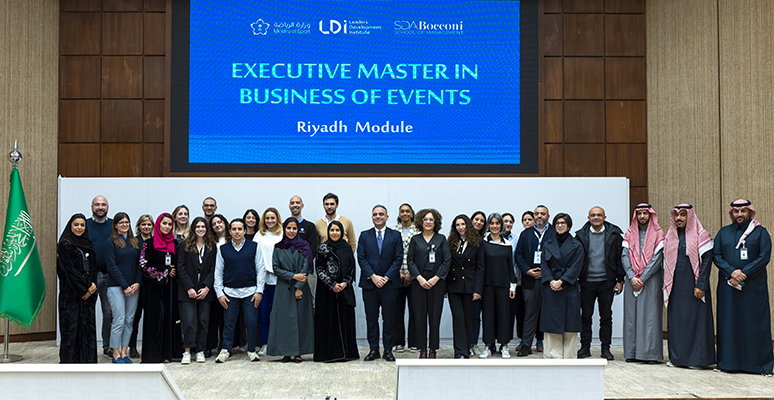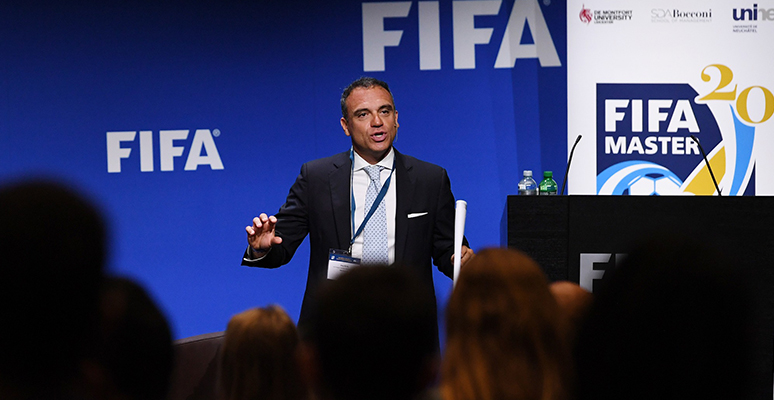
- Start date
- Duration
- Format
- Language
- 16 Sep 2026
- 40 hours
- Online
- Italian
Offer sports organizations know-how, rationales and tools to support and “professionalize” management and managerial activities.
Launched at SDA Bocconi together with La Gazzetta dello Sport and supported by Deloitte and eToro, the first edition of the Football Business Forum opened a new chapter in the conversation between academia, institutions, media and the football industry. A full day dedicated to analyzing the game through management, finance and innovation.
Kicking off the day, Gimede Gigante, Scientific Director of the Forum, set the stage for an open, data-driven discussion on how governance, finance and culture intersect in shaping the future of football. Stefano Caselli, Dean of SDA Bocconi, underscored that management in sport “means responsibility, the ability to combine value with values.” Francesco Carione, Managing Director at La Gazzetta dello Sport, highlighted a growing awareness of the business behind the game. Gianni Valenti, Deputy Editor-in-Chief and Scientific Director of the Forum called the event “a step towards a programmatic manifesto for the future of football,” while Dino Ruta, Rector’s Delegate for the Olympic Movement and Director of SDA Bocconi’s Sport & Entertainment Knowledge Center broadened the perspective: “From revenues to impact, football can shape generations, cities and society.”
Investing in football’s future
The first panel examined football’s economic foundations. Moderated by Gigante, it brought together Dean Caselli, Alessandro Barnaba, Founder of Merlyn Advisors and Owner of Lille OSC, and Giuseppe Marotta, President & CEO of FC Internazionale Milano.
The debate dissected why financial stability requires patience, coherent governance and a managerial culture that prioritizes performance over short-term fixes. Whether through club management, investment strategy or ownership structure, one message converged: ambition must be matched by responsibility.
Governance at the heart of the game
In an exclusive conversation with La Gazzetta dello Sport’s Fabio Licari, UEFA President Aleksander Čeferin addressed the new Champions League format, financial sustainability and rising markets. His stance was clear: integrity and balanced governance are essential to safeguarding competitiveness.
The economics of the transfer market
Moderated by Pierfilippo Capello, Head of Sports at Deloitte Legal, the session brought together Frank Trimboli, Managing Director at CAA Stellar, Maheta Molango, CEO of the Professional Footballers’ Association for England and Wales, and Edwin van der Sar, former Ajax executive and football legend.
The conversation explored the pressures shaping football’s most volatile arena, the transfer market, addressing the need for clearer frameworks, transparent mechanisms and shared responsibility among clubs, players and agents. Themes such as mobility, youth development and the growing complexity of intermediary roles highlighted how the market has evolved into a multidisciplinary ecosystem where governance, education and regulation all intersect.
A transatlantic vision
In the dialogue with the NBA, the spotlight widened beyond football. La Gazzetta dello Sport journalist Davide Chinellato interviewed George Aivazoglou, NBA General Manager for Europe and the Middle East, who illustrated how NBA Europe aims to mirror European football’s cultural depth while introducing elements of permanence, merit and community. The project’s focus on partnerships with clubs and investment in modern arenas offered a bridge to one of the Forum’s central themes: the strategic importance of infrastructure.
Stadiums as revenue powerhouses
Moderated by Federico Pippo, Director of the Master in Corporate Finance, the panel brought together Greg Carey, Globe Co-Head of Sports Franchise at Goldman Sachs, Aurelio De Laurentiis, President of S.S.C. Napoli, Paolo Scaroni, President of A.C. Milan, and Declan Sharkey, Global Director and Senior Principal at Populous.
The discussion examined how stadiums are rapidly becoming economic engines, mapping a shift from single-purpose grounds to multi-use civic hubs activated year-round. Financing models, public–private cooperation and regulatory frameworks were all presented as decisive enablers.
Sport & Tech: from big data to AI
The afternoon shifted to innovation with Carlo Favero, Full Professor of Financial Markets at Bocconi University, moderating a discussion between Pierluigi Collina, Chairman of the FIFA Referees Committee, Edoardo Noto, T&T Customer/Digital at Deloitte, Fernando Suárez, Director at IBM Software Spain, Portugal, Greece & Israel, and Elías Zamora, Chief Technology Officer at Sevilla FC.
The panel explored technology’s role in elevating performance, decision-making and fan engagement, such as the acceleration of VAR, the expanding potential of AI, and the cultural groundwork required to turn data into value. A recurring theme was the balance between technological precision and human judgement, ensuring innovation enhances, not replaces, the essence of the sport.
CEO’s face to face
In one of the day’s most candid panels, moderated by Sport and Finance Journalist and Editorial Coordinator of the Forum Dario Donato, Massimo Adalberto Benassi, CEO of Deportivo La Coruña, Pablo Longoria, President of Olympique de Marseille and Lina Souloukou, CEO of Nottingham Forest FC, discussed financial discipline, multi-ownership and infrastructure.
Across different leagues, the conversation highlighted the demands of managing financial stability, navigating multi-ownership structures and leveraging infrastructure as a long-term asset. The shared conclusion: modern football leadership requires strategic rigor, regulatory awareness and the ability to reconcile ambition with discipline.
Unlocking the value of football content
Moderated by Stefano Rossi, Full Professor of Finance at Bocconi University, the final panel explored media rights and digital content with Stefano Azzi, CEO for Italy at DAZN Group, Valerio Gori, Chief Marketing Officer at Club Atlético de Madrid, Ezio Maria Simonelli, President of Serie A, and Javier Tebas, President of LaLiga.
The rise of streaming technology, direct-to-fan models, personalized formats and the need to protect intellectual property all emerged as structural forces reshaping the industry. Clubs, leagues and platforms were aligned on one point: growth depends on owning the relationship with fans and investing in quality, innovation and global reach.
Capital, craft and the culture of winning
The day closed with two complementary lenses on leadership and performance. Stephen Pagliuca, Founder and CEO of Pags Group and co-owner of Atalanta BC, in conversation with La Gazzetta dello Sport’s Massimo Oriani, outlined Atalanta’s formula of academy development, disciplined trading and a year-round stadium. Giorgio Chiellini, Director of Football Strategy at Juventus, with Pierfrancesco Archetti, brought a player’s clarity to strategy: develop talent, know fans “in detail, not in bulk,” and conceive the stadium as a program.
Closing perspective
The Football Business Forum 2025 marked a decisive step in strengthening dialogue between academia, institutions and the football industry. Throughout the day, one message emerged with clarity: the future of the game will depend not only on capital, but on the quality of its governance, the depth of its culture and the strength of its leadership.
Closing the event, Gigante emphasized how the Forum represents “a starting point for building a shared language between academia, institutions, industry and media where economic sustainability and managerial responsibility become the foundations of a new model of growth for football.”
With this first edition, SDA Bocconi and La Gazzetta dello Sport have initiated a broader process of reflection and collaboration, one that will continue to shape the rules, opportunities and responsibilities of the game, on and off the pitch.
SDA Bocconi School of Management

Offer sports organizations know-how, rationales and tools to support and “professionalize” management and managerial activities.

